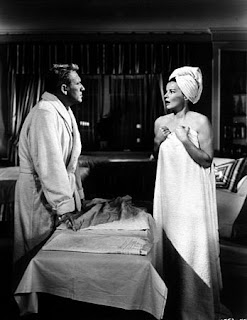Werth: Oh, hello, Wise. I've been doing jury duty all week and I'm bored, bored, bored.
Wise: Aren't you excited by fulfilling your civic duty?
Werth: I'd only be excited by my civic duty if it involved Christopher Meloni and the patented Dick Wolf sting.
Wise: Come on, Werth. It's your chance to participate in the wheels of justice. And, of course, it's the perfect opportunity to salute the pleasures of cinematic courtroom drama, like Billy Wilder's Witness for the Prosecution (1957). Adapted from Agatha Christie's West End hit dramatization of her own short story, Witness stars Charles Laughton as Sir Wilfrid Robarts, a brilliant English barrister just returned from a months-long stay in the hospital after a heart attack.
Famous for his unconventional tactics, Sir Wilfrid cannot resist—despite the strenuous objections of his nurse Miss Plimsoll (Laughton's real-life wife Elsa Lanchester)—when an intriguing case falls into his lap.
Werth: Thinking of Elsa and Charles together in flagrante makes me want to object.
Wise: Hapless veteran Leonard Vole (a very sweaty Tyrone Power) stands accused of murdering a rich spinster who had just made him the beneficiary of her will. His only alibi in the face of mounting circumstantial evidence is the testimony of his frigid German wife Christine (Marlene Dietrich).
Recognizing that Christine's chilly demeanor will only stymie his defense, Sir Wilfrid instead pokes holes in the prosecutor's theories and seems close to winning until Christine is called to testify against her husband. At the last minute, a mysterious phone call leads to evidence securing Leonard's exoneration, but it also raises Sir Wilfred's suspicions, culminating in a series of shocking reversals that theater owners warned viewers not to reveal.
Werth: The only mysterious phone call in my jury session was some old lady's marimba ringtone.
Wise: Part of Christie's genius is her ability to indulge in stereotypes as well as subvert them: Sir Wilfrid is both a blustering fool and a canny defender; Christine is both heartless and undone by her emotions. Wilder capitalizes on this by heightening both the drama and the campy-ness—even creating the role of the nurse to take advantage of Lanchester's chemistry with Laughton—making Witness probably the best film version of any Christie property.
Werth: Even better than Murder on the Orient Express?
Wise: Yes, because I think Witness really captures Christie's sense of humor. Her books feature some brutal crimes, but they're leavened by a certain tongue in cheek quality that the plummier adaptations of her work miss. For all its pleasures, Orient Express overindulges in nostalgia for 1930's Deco Britain, and misses the point (that Wilder so brilliantly captures) that Dame Agatha's idealized England is the conveyance for murderous hijinks and not the destination itself.
Werth: If you're in the mood for hijinks, no courtroom has more of them than the Tracy-Hepburn classic, Adam's Rib (1949). Adam (Tracy) and Amanda (Hepburn) are married lawyers who find themselves on the opposite sides of the table at an attempted murder trial. Adam wants to throw the book at ditzy, would-be murderess Doris Attinger (a sparkling Judy Holliday), but Amanda defends her, turning the trial into a crusade for women's equality.
Wise: I love when homicide transforms into urbane wit.
Werth: Written by married screenscribes Garson Kanin and Ruth Gordon, Adam's Rib mines the seemingly endless gold that the Tracy-Hepburn screen-teaming produced.Tracy is gruff and charming as a somewhat old-fashioned man who loves and respects his wife—but believes that the law is the law. Hepburn is regal in her defense of womanhood, but at the same time a giddy woman in love with her man.
The courtroom moves into the bedroom and vice versa as the two butt heads and soon these two legal eagle love birds are pecking each other's eyes out. The famous massage scene culminates with the heinie smack heard around the world.
Wise: The happy ending joke writes itself.
Werth: By the end we are less worried about who wins the case and more about how these two people who are made for each other will find their way back to a happy marriage. Tracy and Hepburn were so good at these battle of the sexes flicks because they gave their comedy a serious side.
If he was just a sexist pig and she an overheated women's libber, these movies would never work. But these two actors were so skilled at working their love and respect for each other into their characters that Adam and Amanda feel more full and real—making us see both sides and wanting to find a way for both of them to be right.
Director George Cukor also wisely enlisted the comic abilities of Holliday and fey-neighbor extraordinaire David Wayne to heighten the level of comedy in the picture without making Tracy and Hepburn shoulder all the humor. Many feel Adam's Rib is the best display of the Tracy and Hepburn magic, and this juror is happy to find in their favor.
Wise: So did your jury service end with you hooking up with Cher like Dennis Quaid did in Suspect (1987)?
Werth: Only the jury box knows for sure. Tune in next week for more legal shenanigans from Film Gab!
























